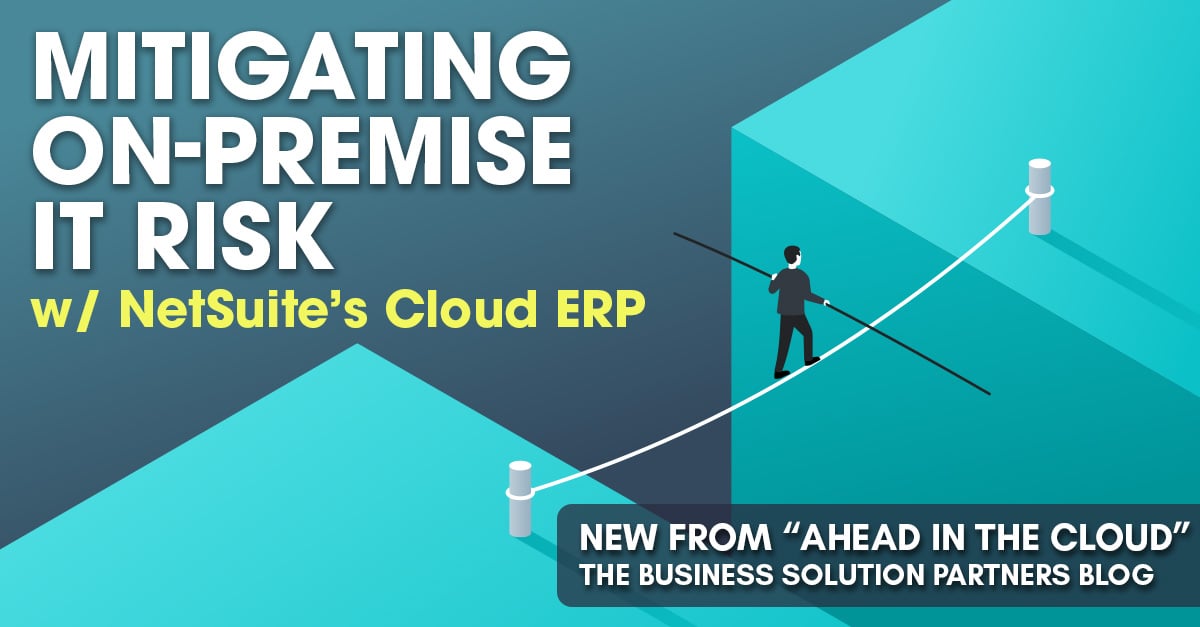NetSuite's Cloud Solution: Mitigating On-Premise IT Risk
On-premise IT infrastructure has been the traditional method for companies to store and manage their data. However, there are various risks...
2 min read
David Smooha : Feb 5, 2015 5:00:00 AM

 Transitioning to cloud solutions offers several important advantages over maintaining your infrastructure on-premises. Here are five benefits of using the cloud for your ERP, CRM and other infrastructure:
Transitioning to cloud solutions offers several important advantages over maintaining your infrastructure on-premises. Here are five benefits of using the cloud for your ERP, CRM and other infrastructure:
Streamlined, automated workflows: A cloud ERP system helps to automate processes, reducing manual tasks and managing workflows for labor-intensive projects. For a process like purchasing approvals, which used to require lots of emails and paper invoices going back and forth, the necessary steps are defined in an automated task list of sorts that ensures tasks happen in the correct order to get the required approval.
Agile, self-service tools: The user-friendly analytics tools and reporting dashboards offered by many cloud platforms improve your organization’s agility. They give business users the power to pull the information they need instead of waiting for someone else to email a spreadsheet or report to them after the data has been compiled.
Fewer time-consuming errors: With a cloud-based system, there’s no more need for updating spreadsheets and emailing documents to colleagues. By storing the information in a central database, you end up with better accuracy in collaborative documents and version control, so you stop wasting time looking for the most up-to-date version.
Robust data security and disaster recovery: Compared to an on-premises solution, a cloud-based solution typically provides better uptime, improved security and redundant data backups. When businesses store crucial information on-premises, they may be unable to recover these assets in the event of a flood, fire or other disaster. With the cloud, you’re far better prepared to recover from a disaster. Your essential information is kept safe in secure data centers in other geographical regions.
Improved compliance: When you’re trying to run your own system on-premises, ensuring compliance with regulations and internal controls is a major headache — and failing to keep up presents a significant risk for the company. By moving to a cloud solution, the job falls to your cloud partner, which runs the necessary audits and provides you with recommendations for improving security. When working with a reputable cloud provider, their systems should be independently verified.
Whether your organization is large or small, putting your time and resources toward projects that directly add value is the key to staying competitive. Compared to the hassle and expense of maintaining your infrastructure on-premises, transitioning to the cloud offers several ways to improve performance and enable cost-effective solutions for day-to-day IT administrative tasks.
Are you looking for ways to improve your operations? Download our free e-book, "The Benefits Of Using The Cloud For Your Distribution Business Software, to discover how your business could benefit from cloud-based distribution business software, such as a cloud ERP or cloud CRM system.

On-premise IT infrastructure has been the traditional method for companies to store and manage their data. However, there are various risks...
More distributors and manufacturers are using NetSuite’s cloud ERP software. This can be attributed, in part, to the two-tier deployment model. This...

"In the process we realized, that we not only had to design the software, we had to implement the infrastructure as well..."